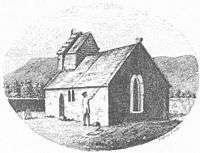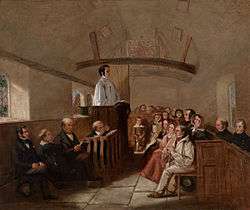St Lawrence, Isle of Wight

St Lawrence is a village on the south side of the Isle of Wight, in southern England. It is located to the west of Ventnor and many consider it a part of that town. St Lawrence is situated on the Undercliff, and is subject to regular landslips.
Features



St. Lawrence is much older than Ventnor. One of its churches dates from the 12th century; before the addition of a chancel in 1830, it was only 25 feet long and 11 feet wide, and was considered the smallest church in England. Although there are undoubtedly smaller chapels including the tiny church at Les Vauxbelets on Guernsey, this arguably remains the smallest to be built as a parish church — although this role has long since been supplanted by a larger church in the village - see St. Lawrence's Church, St. Lawrence. It also has a 15th-century baptismal font - a stoup that is about 500 years old and a series of 18th-century hat pegs. The piscina niche is almost the same age as the church.
The larger church at St. Lawrence dates from the 19th century, but has a 17th-century altar and a chest that dates from 1612.
There was a glassworks styled as Isle of Wight Glass by the Old Park Hotel in St. Lawrence but this is now closed. Nearby is the site of the Tropical Bird Park, which is also now closed. Close to the newer church is the site of the Rare Breeds Park, which closed while the A3055 road was closed to the west of the village due to landslip.
William Spindler
St Lawrence was in the nineteenth century the subject of an ambitious plan by a German developer, named William Spindler (who had made his fortune as a chemist in Berlin), to develop St Lawrence as a resort to rival Ventnor. He lived on the Isle of Wight from 1881 to his death in 1889 and is buried in Whitwell. During his time in St. Lawrence he had an enormous influence there and on the surrounding areas. He possibly alienated local opinion with a series of "improving pamphlets" criticising local perceived laziness. His legacy has been a number of grand Victorian houses, often semi-derelict and half hidden by woodland. Perhaps his most noticeable memorials are several huge pieces of masonry in Binnel Bay, which once formed a harbour which is all but inaccessible from the land. These have fallen into titanic ruins and are known locally as "Spindler's Follies".[1]
Transport
It is linked to other parts of the Island by Wightbus bus route 16, serving Ventnor and Shanklin and intermediate villages.[2] This service was withdrawn along with all other wight bus services in 2011. The village was served by a 2 hourly service by Southern vectis' route 6 between Ventnor and Newport until a landslip between St Lawrence and Niton in 2014. Since February 2014 Southern Vectis route 6 terminates at Ventnor Botanic Gardens with a more limited morning service between St Lawrence village and Ventnor.
References
- ↑ Lake House Design: William Spindler
- ↑ "Traveline - Wightbus route 16". traveline.org.uk. 2008. Retrieved 2008-05-04.
External links
| Wikimedia Commons has media related to St Lawrence, Isle of Wight. |
- Two walking Heritage Trails around St Lawrence, one around the village and the other along the coast
| ||||||||||||||||||||||
Coordinates: 50°35′19″N 1°14′23″W / 50.58861°N 1.23972°W